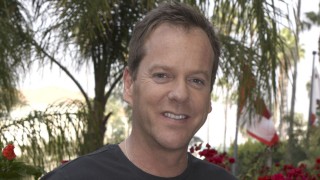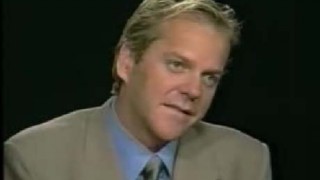Q: 24, considered the hottest show on TV… There’s a lot of anticipation for the premiere. You guys are taking a chance, since your premiere is going to be commercial-free.
SUTHERLAND: Actually Ford’s taking a big chance. They’re paying for it.
Q: How do you feel about the premiere being commercial-free?
SUTHERLAND: We’re excited about it. Thing is, we’ve been disappointed when it’s not commercial free.
Its success in England was phenomenal. It was the biggest show the BBC has ever had. It was the number one DVD there; knocked off Lord of the Rings, which is unheard of for a television show DVD to actually knock-out every feature DVD available. And that’s because they showed it without commercials. Stephen Hopkins, who directed the thing has never made television before. I’ve never made television before. It’s one of the funniest things I’ve ever seen. The two of us took a look at it and went, um, okay, you’re right, go with it, this is good. And we went to the premiere, and they did a fantastic party the night it aired. And we’re sitting there watching. And I was like, well, okay, that went well. That played okay. Boom! A commercial came on and Stephen was stilted for a moment. He looked over his shoulder and said [in an English Accent] ‘I’d like a double Vodka on the Rocks.’ And I said, ‘I’ll have what he’s having.’ We’ve never done television before. We’d forgotten that they were going to put commercials in it. And so, what we thought moved like a bullet kinda went [downward hands] like this. And so, obviously we’re very excited for them to show it like this. And eventually I think it’s going to be the way of television. I don’t exactly know now they’re going to figure out how to advertise, ’cause they will. Whether it’s product-placement within the show itself. I know we’re driving Fords this year, and a lot of them. But no, we’re grateful to Ford for doing it. And, you know, I always think it’s fantastic when you show the World Cup and they do that commercial-free. And I’m grateful that, at least for the first hour, we get to do that here as well.
Q: Were they talking about doing 36 or 42 instead of 24 for a while?
SUTHERLAND: No, because I think at some point someone’s going to sleep. I think they were very smart. Our show starts a year-and-a-half after the last day, and the day starts out, and it still tracks a day-and-a-half later. Father and daughter are still dealing with the loss of the wife and expectant mother, and the show picks up from there. So there’s still… because of the ending of last season… this deep core that connects both days together. But, you know, there certainly had to be a time separation.
Q: Do you think the show benefits from you guys not having done television?
SUTHERLAND: I certainly do. I know the show benefited from Stephen Hopkins having not done television before. … And this is one of the problems with television, network television specifically – there are limitations. There are creative limitations by virtue of standards and practices, although they are shifting greatly, those limitations still do exist. Stephen wasn’t aware of them, so he just rode right over them. I mean, the idea of creating those boxes I thought was ingenious, and that was not in the script, that was Stephen Hopkins. He created the style that I’m watching them use now that utilizes commercials, music videos, and… I think I saw it on the news the other day… where they actually, instead of just showing… you know… they go over the journalists’ shoulder and then to the interviewee – they actually have them both in boxes talking to each other. It was like [Kiefer gives a bewildered look] and I’ve only seen that as a direct result of Stephen Hopkins’ style and the way he shot 24 and made it work. So yeah, Stephen approached the show completely open, with the limitations, and without having been beaten-up like so many television directors I believe have been over the years. ‘No, you have to do it this way, etc.’ Stephen approached it completely free.
Q: What was your response to 24‘s finale? It took such a turn…
SUTHERLAND: (heavy sigh) It was hard, I mean, on so many levels. First off, from the show’s perspective – good on them. They lived true to what we needed and started out to do. Which was if you expect that we’re going to live by the conventions of any television show and you think any single person, myself included, is safe on this show, you’re wrong. They will go to incredible lengths to shock you. That’s what the show is, and that’s what we do. So, good for them. On a personal level, I lost my right hand. Leslie Hope I think is one of the most incredible actors in the world. She’s a friend. And she had the other story line, and I never had to worry about that. Literally, it got to a point where I could start reading my own stuff, and not even worry abut what her stuff was. Because I knew we were safe. And so I, you know, selfishly lost someone that I cared about working with very much. So that was very disappointing. But for the show, yeah… no one saw that coming. And I like that. I like it a lot.


